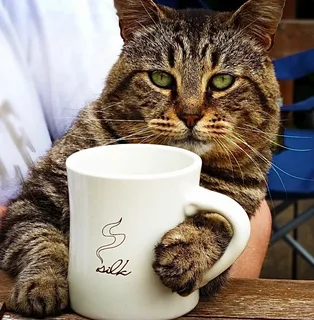Can Cats Have Coffee? Understanding the Risks and Health Implications

Introduction
As a pet owner, it's natural to wonder about the foods and drinks that are safe for your furry friends. One common question is, "Can cats have coffee?" This question often arises because coffee is a popular beverage among humans, and curious cats might be tempted to take a sip. In this article, we will explore the potential risks and health implications of cats consuming coffee, and provide you with the information you need to keep your feline companion safe.
The Risks of Coffee for Cats
Caffeine Toxicity in Cats
Cats are highly sensitive to caffeine, a stimulant found in coffee. Even small amounts of caffeine can lead to caffeine toxicity, which can have serious health consequences. Symptoms of caffeine toxicity in cats include restlessness, rapid breathing, heart palpitations, muscle tremors, and in severe cases, seizures or collapse.
Why Caffeine is Dangerous for Cats
Cats lack the enzymes needed to metabolize caffeine effectively. This means that caffeine stays in their system longer, increasing the risk of toxicity. Unlike humans, who may enjoy the stimulating effects of caffeine, cats can suffer from adverse reactions even with minimal exposure.
Common Sources of Caffeine
Aside from coffee, caffeine is found in various other sources that your cat might encounter. These include tea, energy drinks, soda, chocolate, and certain medications. It's crucial to keep these items out of your cat's reach to prevent accidental ingestion.
Symptoms of Caffeine Poisoning in Cats
Early Signs to Watch For
If your cat accidentally consumes coffee or any caffeinated product, early symptoms of caffeine poisoning may appear within a few hours. These symptoms include:
-
Hyperactivity
-
Agitation
-
Rapid breathing
-
Increased heart rate
-
Tremors
Advanced Symptoms of Caffeine Poisoning
In severe cases, caffeine poisoning can escalate to more serious symptoms such as:
-
Vomiting
-
Diarrhea
-
Seizures
-
Muscle rigidity
-
Collapse
Immediate veterinary attention is required if your cat shows any of these symptoms.
What to Do if Your Cat Consumes Coffee
Immediate Steps to Take
If you suspect your cat has consumed coffee, take the following steps immediately:
-
Remove Access: Ensure your cat cannot consume any more coffee or caffeinated products.
-
Monitor Symptoms: Keep a close eye on your cat for any signs of caffeine poisoning.
-
Contact Your Veterinarian: Call your veterinarian for advice on the next steps. They may recommend bringing your cat in for an examination.
Veterinary Treatment for Caffeine Poisoning
If your cat is diagnosed with caffeine poisoning, your veterinarian may administer treatments such as:
-
Activated Charcoal: To absorb remaining caffeine in the stomach.
-
Intravenous Fluids: To maintain hydration and support kidney function.
-
Medications: To manage symptoms such as tremors or seizures.
Preventing Accidental Coffee Consumption
Keep Coffee Out of Reach
To prevent your cat from accidentally consuming coffee, always store it in a secure place. Do not leave coffee cups unattended, especially in areas where your cat has access.
Educate Household Members
Ensure that everyone in your household is aware of the dangers of caffeine for cats. This includes informing guests who might bring coffee into your home.
Safe Alternatives for Cats
Provide your cat with safe and enjoyable alternatives to keep them away from potentially harmful substances. Catnip, cat grass, and specially formulated cat treats are excellent options.
Can Cats Have Decaffeinated Coffee?
The Truth About Decaf Coffee
While decaffeinated coffee contains significantly less caffeine than regular coffee, it is not completely caffeine-free. Therefore, it is still not safe for cats to consume decaf coffee. The small amount of caffeine present can still pose a risk to your cat's health.
Other Ingredients to Consider
Even if the caffeine content is low, other ingredients in coffee, such as milk, sugar, and artificial sweeteners, can also be harmful to cats. Milk can cause digestive upset, and artificial sweeteners like xylitol are toxic to cats.
FAQs
Can cats drink coffee-flavored water? No, even coffee-flavored water can contain traces of caffeine, which is harmful to cats. Always provide your cat with fresh, clean water.
Is it safe to let my cat lick my coffee cup? No, even a small amount of coffee residue can be dangerous for your cat. Avoid allowing your cat to lick your coffee cup.
Are there any beverages that are safe for cats? Cats should primarily drink water. Some cats enjoy cat-specific milk, which is formulated to be safe for their digestive systems.
What should I do if my cat shows signs of caffeine poisoning? If your cat shows signs of caffeine poisoning, contact your veterinarian immediately for advice and potential treatment.
Can other pets handle caffeine better than cats? Caffeine is toxic to most pets, including dogs and small animals. Always keep caffeinated products out of reach of all pets.
Is there a safe amount of caffeine for cats? No, there is no safe amount of caffeine for cats. Even small amounts can cause toxicity and should be avoided.
Conclusion
In conclusion, cats should never be given coffee or any caffeinated products. The risks and health implications of caffeine toxicity are severe and can lead to life-threatening conditions. As a responsible pet owner, it's essential to keep coffee and other caffeinated items out of your cat's reach and provide safe alternatives for their enjoyment. Always consult your veterinarian if you suspect your cat has consumed caffeine or shows signs of poisoning. Keeping your feline friend safe and healthy is a top priority.
- Industry
- Art
- Causes
- Crafts
- Dance
- Drinks
- Film
- Fitness
- Food
- Games
- Gardening
- Health
- Home
- Literature
- Music
- Networking
- Other
- Party
- Religion
- Shopping
- Sports
- Theater
- Wellness
- News


